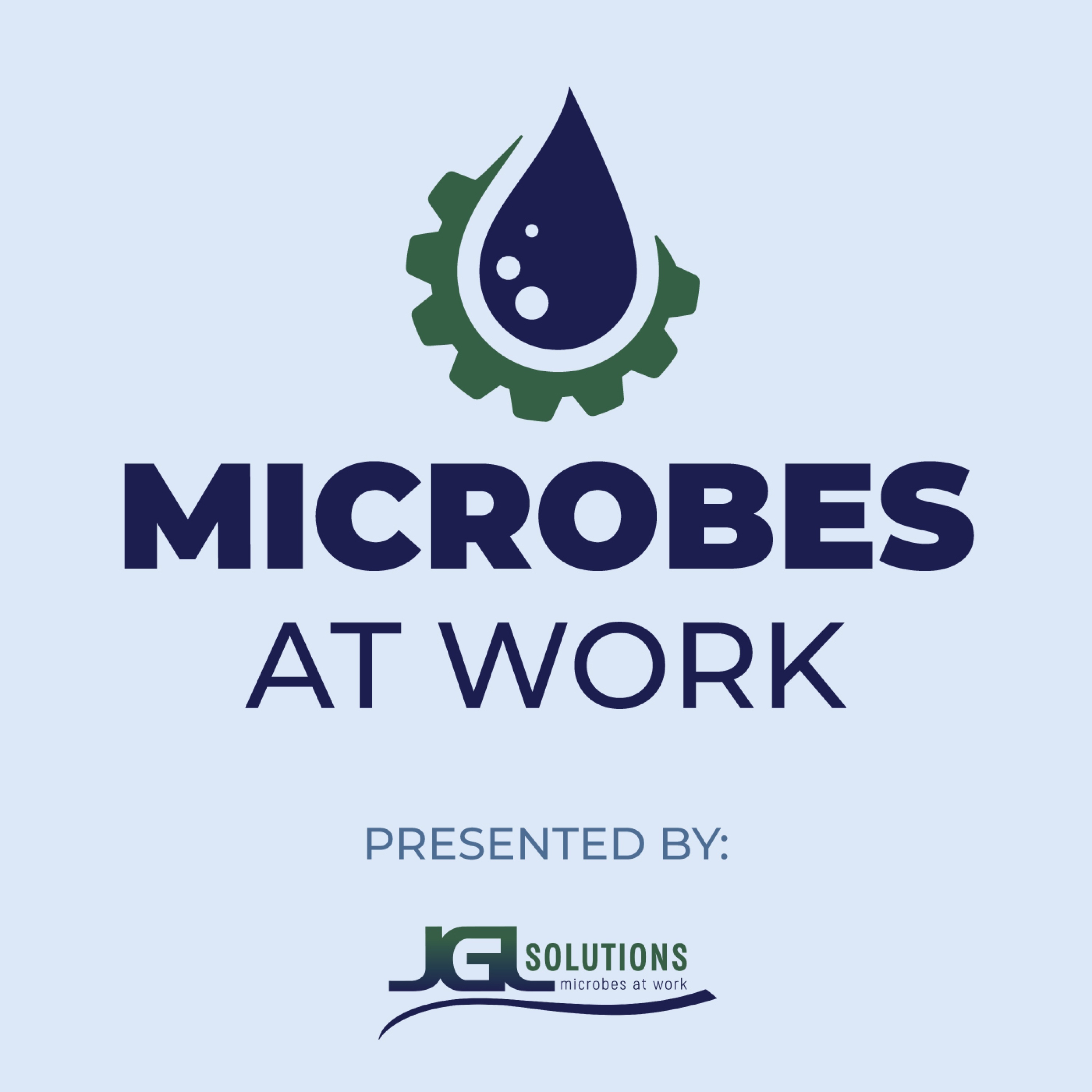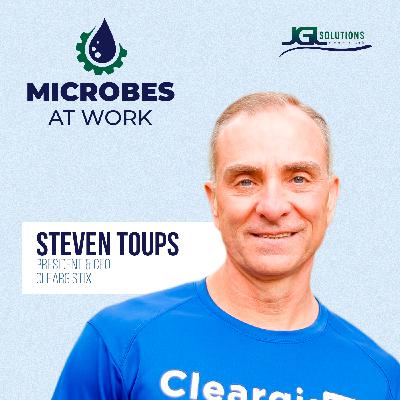Discover Microbes at Work
Microbes at Work

Microbes at Work
Author: JGL Solutions
Subscribed: 0Played: 0Subscribe
Share
© 2021
Description
Welcome to Microbes at Work, a podcast from JGL Solutions and your one-stop-shop to learn everything you need to know about microorganisms in the oil field. You'll hear about the fundamentals and benefits of our process from people in the field and in the office as we lead the way for microbial solutions.
12 Episodes
Reverse
Bill’s father was a petroleum engineer who quit working at a drilling company when oil prices dropped, and he was forced to fire many workers. He later met a microbiologist involved in restaurant wastewater management and learned how to treat by injecting microbes. Bill helped his father sell these microbes and established JGL Solutions in his father’s name after he passed away. “My strength wasn’t being a businessman, it was knowing the microbes and how they’re applied and sales, I was pretty good at sales, but it was only because I believed in what the product did,” Bill said. He added that his faith in the Lord contributed greatly to his success. JGL’s values include honesty, a spirit of excellence, pride in their work, and integrity. Bill explained, “There’s always times when you kind of have to bite the bullet money-wise to do the right thing.” He continued, “But it’s really not even a hard thing to do. It’s just part of your DNA.” The Lantz's are not just leading a business, but leading a group of people. Bill focuses on creating meaningful relationships with employees by helping them through personal struggles. Tami’s goal for the future of the company is: “I want our employees to feel more and more like a family.” JGL’s mission is “To revolutionize the oilfield with the most effective, yet sustainable solutions.” Most of the industry doesn’t know what microbes can do, so Bill believes JGL will continue to grow rapidly. To learn more about JGL, visit jglsolutions.com.
Bill Lantz, CEO of JGL Solutions, and Paul Wiseman, president of Fit to Print, explained microbial treatments in the oil and gas industry to Host Tyler Kern. The pair are hopeful in promoting the process’s many benefits when compared to traditional chemical treatments.Lantz explained how scale and corrosion affects all aspects of the holding containers, like flowlines, tanks, filters and downhole injection sites. Comparing it to a film on your drinking glass, scale happens at a rate of nearly 100 times in the oil field, which causes major inefficiencies. The main culprit? Oxygen and ions. Oxygen is a catalyst for corrosion, and there are several ions that cause issues downstream. Some of these ions include calcium carbonate, iron sulfide and iron oxide.Currently, the leading treatment in the industry is to use harsh chemicals to prevent any further build up; however, chemicals can only prevent future build up and comes with many regulations due to its toxicity.In contrast, microbial treatments provide a more cost-effective option that treats existing and prevents future scale and is sustainable. JGL analyzes many factors to determine the type of microbes to maintain about 1 million cells per 1 milliliter of fluid. Luckily, microbes reproduce and start a colony, making upkeep minimal. This process saves customers an upward of 50% on tank cleaning, causes pressures to go down and flows to go up, improves water quality, and allows workers to focus on maintaining equipment instead of treating scale and corrosion.Wiseman and Lantz encourage industry leaders to think long term since de-scaling existing buildups can take time. However, once the microbes break down the hard matter, customers will see significantly decreased filter changes. Ultimately, “the proof is in the pudding, and in this case, the proof is in the de-scaling,” Wiseman confidently stated. Visit JGLSolutions.com to view the whitepaper and supplementing information.
Bill Lantz, CEO of JGL Solutions, and Paul Wiseman, president of Fit to Print, explained microbial treatments in the oil and gas industry to Host Tyler Kern. The pair are hopeful in promoting the process’s many benefits when compared to traditional chemical treatments.Lantz explained how scale and corrosion affects all aspects of the holding containers, like flowlines, tanks, filters and downhole injection sites. Comparing it to a film on your drinking glass, scale happens at a rate of nearly 100 times in the oil field, which causes major inefficiencies. The main culprit? Oxygen and ions. Oxygen is a catalyst for corrosion, and there are several ions that cause issues downstream. Some of these ions include calcium carbonate, iron sulfide and iron oxide.Currently, the leading treatment in the industry is to use harsh chemicals to prevent any further build up; however, chemicals can only prevent future build up and comes with many regulations due to its toxicity.In contrast, microbial treatments provide a more cost-effective option that treats existing and prevents future scale and is sustainable. JGL analyzes many factors to determine the type of microbes to maintain about 1 million cells per 1 milliliter of fluid. Luckily, microbes reproduce and start a colony, making upkeep minimal. This process saves customers an upward of 50% on tank cleaning, causes pressures to go down and flows to go up, improves water quality, and allows workers to focus on maintaining equipment instead of treating scale and corrosion.Wiseman and Lantz encourage industry leaders to think long term since de-scaling existing buildups can take time. However, once the microbes break down the hard matter, customers will see significantly decreased filter changes. Ultimately, “the proof is in the pudding, and in this case, the proof is in the de-scaling,” Wiseman confidently stated. Visit JGLSolutions.com to view the whitepaper and supplementing information.
On this episode of Microbes At Work, host Tyler Kern talked with Bill Lantz, CEO at JGL Solutions. The duo dug into cracking paraffin chains and how JGL works to prevent these chains from causing issues in the oil well. “Long-chain hydrocarbons are usually considered paraffin in the oil field,” Lantz said. “Paraffin is the wax, just like candle wax. The long chains are comprised of the oil, and they cause the oil to thicken up like the candle wax, and then you’ve got a problem in the oil well.” JGL uses microbes to break the chains and actually change them to lower-carbon chains, also known as cracking. This is similar to what oil refineries do to improve the oil. When this occurs successfully, the paraffin is no longer present, and it makes better quality oil. “What you get from that is the paraffin is no longer there, and it’s now a lower carbon chain of oil,” Lantz said, “You don’t get the plugging and the hot oil.” There are times when it becomes so hard and thick in a well that it shuts it down. When it gets to this stage, not only is the well shut down, but it can lead to costly equipment repair. Mechanically, there are a couple of ways you can deal with paraffin. Oil companies pay hot oilers to come and heat the oil to over 200 degrees and run it down the well, which helps melt the wax. Long-chain hydrocarbons increase the pour point of the oil, and, when the oil cools, it starts to harden. This is something that shouldn’t happen in the well. Using microbes, JGL breaks the carbon chain down without the need to heat the oil. This saves time and money on hot oiling.
On this episode of Microbes At Work by JGL Solutions, we're introducing you to Cleargistix, an excellent partner of JGL Solutions whose mission is to transform the oil and gas industry.
On this episode of Microbes At Work, host Tyler Kern talked with Bill Lantz, CEO at JGL Solutions. The duo dug into cracking paraffin chains and how JGL works to prevent these chains from causing issues in the oil well. “Long-chain hydrocarbons are usually considered paraffin in the oil field,” Lantz said. “Paraffin is the wax, just like candle wax. The long chains are comprised of the oil, and they cause the oil to thicken up like the candle wax, and then you’ve got a problem in the oil well.” JGL uses microbes to break the chains and actually change them to lower-carbon chains, also known as cracking. This is similar to what oil refineries do to improve the oil. When this occurs successfully, the paraffin is no longer present, and it makes better quality oil. “What you get from that is the paraffin is no longer there, and it’s now a lower carbon chain of oil,” Lantz said, “You don’t get the plugging and the hot oil.” There are times when it becomes so hard and thick in a well that it shuts it down. When it gets to this stage, not only is the well shut down, but it can lead to costly equipment repair. Mechanically, there are a couple of ways you can deal with paraffin. Oil companies pay hot oilers to come and heat the oil to over 200 degrees and run it down the well, which helps melt the wax. Long-chain hydrocarbons increase the pour point of the oil, and, when the oil cools, it starts to harden. This is something that shouldn’t happen in the well. Using microbes, JGL breaks the carbon chain down without the need to heat the oil. This saves time and money on hot oiling.
On this episode of Microbes At Work by JGL Solutions, we're introducing you to Cleargistix, an excellent partner of JGL Solutions whose mission is to transform the oil and gas industry.
JGL Solutions is committed to helping customers leverage microbial solutions to find a clean process, long-term success and a better solution for their field – and the oil and gas industry is prepared to benefit from this vision.
Bill Lantz worked for decades in the oil fields as a fluid engineer.He saw just about every issue that can crop up, with companies often turning to chemicals to try and deal with waterflood, saltwater disposals, paraffin and more. Lantz founded JGL Solutions in 2006 after gaining experience utilizing a better solution – microbes.“They have a lot of (issues) that mostly they use chemicals to solve, and, once you know what these are and know there are microbes that actually do the same things chemicals do, only better, and do more than chemicals do, it’s really kind of amazing,” he said. “Being able to apply them at critical spots in a production spots and knowing what you’re doing … is a lot of it.”The microbes provide not only a more effective solution but also one that is better for the environment, something many big energy companies love to hear as sustainability becomes more of a real focus and less of simply a buzzword.“Now, you’re getting companies more worried about what they might actually be doing to the environment, so products like ours are perfect for that,” Lantz said. “What they’re finding out with our microbes is they’re more effective. Not only is it great for the environment, it’s much more effective than what they’re using, anyway.”That makes looking into microbes as a solution for the issues that can occur in oil fields a smart play, and with Lantz and his team having decades of experience in the industry, JGL Solutions should be the first call.









